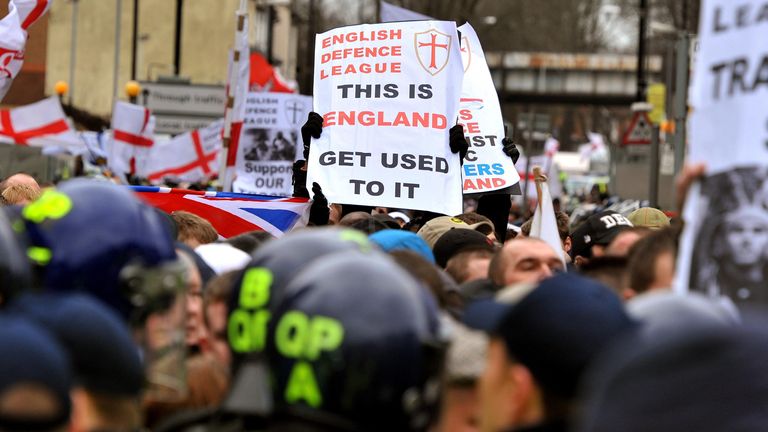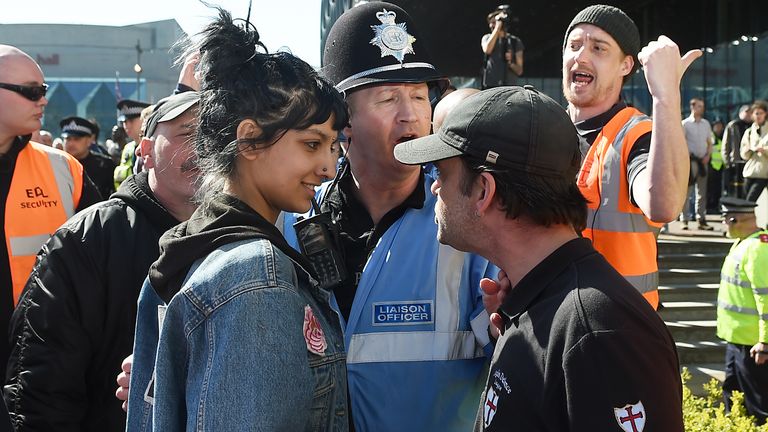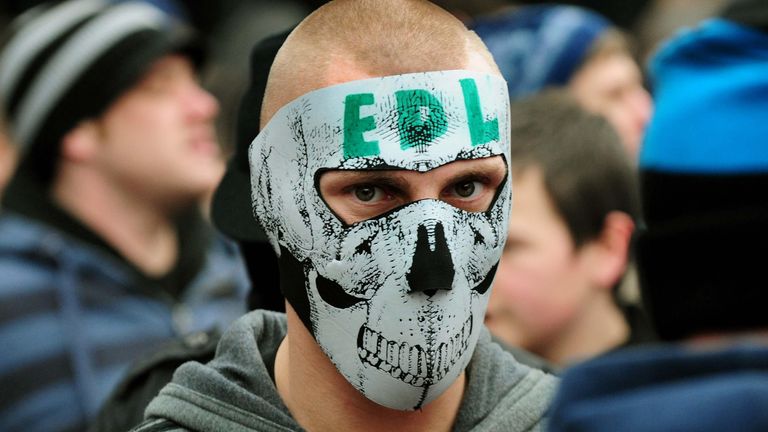A wave of violent protests around the country has raised questions about whether the English Defence League (EDL) - technically a defunct organisation - should be banned under UK terrorism laws.
Deputy Prime Minister Angela Rayner said the Home Secretary Yvette Cooper will "be looking at" whether the EDL could be proscribed - banned under UK law.
The deputy prime minister condemned "thuggish behaviour" after violent scenes broke out following the death of three young girls in a knife attack at a Taylor Swift-themed dance class.
UK protests latest: More clashes expected after some 90 arrests
But what is the EDL, does it still exist, and could it even be proscribed?

What does it mean when something is proscribed?
If an organisation has been proscribed, it has been forbidden under UK law.
Under the Terrorism Act 2000, the Home Secretary may proscribe an organisation if they believe it is concerned with terrorism, and it is proportionate to do so.
Under the act, terrorism means the use or threat of action which involves serious violence against a person, serious damage to property, endangers a person's life or creates a risk to life, to influence the government or intimidate the public.
It must also be carried out with the aim to advance a political, religious, racial or ideological cause.
What is the EDL and what does it believe?
The EDL was founded in 2009 and experienced its heyday in 2011.
Established in London, the group formed around several football hooligan firms protesting the presence of an Islamist group in Luton.
Tommy Robinson - real name Stephen Yaxley-Lennon - a former member of the BNP who had a criminal conviction for assault, became the group’s de facto leader shortly after it was formed.

Ideologically, it sat on the far right of British politics, rejecting the idea that Muslims can truly be English, while promoting Islam as a threat to European values and blaming a perceived decline in “English culture” on high immigration rates.
It distinguished itself from the traditional far-right by rejecting biological racism, antisemitism, and homophobia - evidenced by the existence of subgroups, including Jewish, Sikh and LGBT divisions.
Read more:
'We took beer bottles to our helmets': Bristol riots
Officers attacked and injured in UK clashes
The group adopted the slogan "Not racist, not violent, just no longer silent" and claimed to be standing up for the white working class.
Yet despite this messaging, racist chants continued to ring out at EDL rallies.
Ivan Humble, a former EDL member, told Sky News once he joined the group, he "found a sense of belonging".
Is the EDL now defunct?
The decline of the EDL mirrors that of the BNP, which saw significant support in the 2010 election but has since faded into electoral obscurity.
The profile of the EDL rose dramatically between 2010 and 2013, but soon began to lose momentum - partly due to in-fighting among the group’s different factions.
The group was then revealed to have links to Norwegian far-right activist Anders Behring Breivik, the perpetrator of a series of bombing and shooting attacks in July 2011 that killed 77 people.

In December 2011, two EDL supporters were convicted of plotting to bomb a mosque in Stoke-on-Trent.
By 2013, the number of members attending rallies was in decline, although the group did experience a brief resurgence in the wake of the murder of British Army soldier Lee Rigby.
Robinson left the organisation that same year, amid fears he could not control the group’s more violent followers.

By 2017, the EDL was still making headlines, but this time it was because a march was called off after just six people turned up.
These days, anti-racism group Hope Not Hate says it considers the organisation as non-existent, as does Robinson, the former founder, himself.
Robinson said on X: "The riots are by local residents fed up. Nothing to do with the EDL which closed down over a decade ago."
But although the organisation is now officially considered defunct, the sentiments feeding it - anger at immigration at the heart of it - have remained.
Merseyside police said supporters of the EDL appeared prominent in the Southport disorder after rioters clashed with police outside a mosque on Tuesday night.
Misinformation, peddled by the far right, suggested that the 17-year-old arrested in connection with the knife attack was a Muslim immigrant who had arrived by boat in the UK. That was not true.
Labour MP for Sunderland Central Lewis Atkinson said flags on the street bore the reference to the North East Infidels, "a Nazi, EDL offshoot from the north east chapter of what was the EDL". Images online show flags from the North East Infidels present at Friday's clashes.
Mr Atkinson said individuals previously involved with the EDL are "still out there" and need to be monitored by police.

Could the EDL be proscribed?
This is something the Home Secretary appears to be looking into - but given the organisation is officially defunct, it is unclear what difference this would make.
However, there are rules around aliases, which means if the government believes the EDL to be operating under a different name, that too could be banned.
"You may end up missing the target if you proscribe the organisation," said Lord Walney, a government adviser on political violence.

The priority, he said, should be going after "individual ringleaders who are currently stirring things up and moving from area to area".
"If proscription can be seen to be part of an effective tool in enabling us to get to those individuals, then yes let's try and do it quickly. But because of that complication, I'm not sure whether it is the first thing you go to."
Disclaimer: The copyright of this article belongs to the original author. Reposting this article is solely for the purpose of information dissemination and does not constitute any investment advice. If there is any infringement, please contact us immediately. We will make corrections or deletions as necessary. Thank you.



